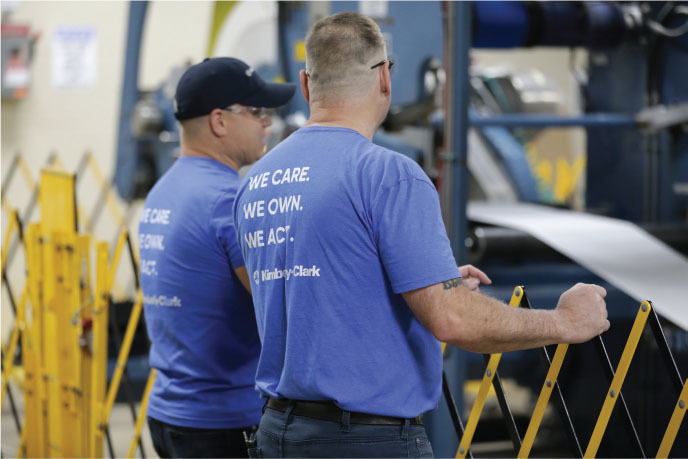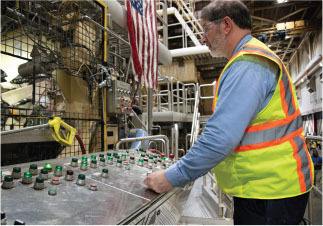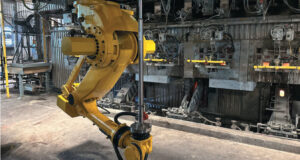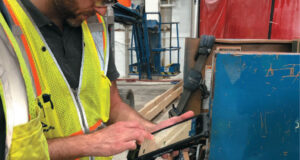Kleenex, Cottonelle, Poise, Kotex, Huggies, Scott, Viva—chances are, you’re using at least one of these brands at home right now. They’re just a few of the big names Kimberly-Clark has built since the company was founded in Neenah, WI, in 1872. Kimberly-Clark products cover a wide range of personal care and household needs and are sold in more than 175 countries. In fact, the company estimates that, every day, about one-quarter of the global population uses a Kimberly-Clark product.
However, this global leadership would mean little to the family of an employee injured producing one of these famous brands. With 45,000 employees, the company feels an imperative to bring the concept of “personal care” to the safety performance of its mills.
At the suggestion of employees, this roll-handling unit at the X-Mill was designed to improve worker safety.
“Kimberly-Clark’s values are a global force that do not shy away from action, especially when it comes to keeping our people safe,” says Geri Klein-Shank, Kimberly-Clark North American director of Environmental, Health, Safety and Sustainability. To that end, Kimberly-Clark has a three-part value statement that stresses that “personal connection” of the company to its workers, and of workers to their roles:
- We Care: We care for our people, our communities and everyone we serve, and we value our differences.
- We Own: We are responsible for our decisions and accountable for our results.
- We Act: We have a bias for action and do what’s right for our people, our business, and our world.
“We can’t expect people to perform at their best unless they feel safe,” says Klein-Shank. “We encourage every employee to connect to their personal ‘why’ behind safety and then empower them to speak up and own their actions. Care is at the heart of everything we do and watching out for each other is key to our ability to deliver Kimberly-Clark’s purpose of ‘Better Care for a Better World’.”

A HISTORY OF FIRSTS
This attitude fits well with the company’s history of being more than a brand leader—Kimberly-Clark has a legacy of introducing never-seen-before product innovation. Of Kimberly Clark’s eight major consumer product categories, five are those the company invented itself: facial tissue, paper towels, toilet paper on a roll, feminine pads, and disposable training pants.
The company operates 100 manufacturing facilities around the world, but no longer produces its own pulp or paper—a brand-focused strategy that the company methodically adopted over its 150-year history. In 1995, Kimberly-Clark had purchased Scott Paper in a US$9.4 billion deal that leveraged complementary product lines and created a company with US$11 billion in sales after the merger.
The company closed its last pulp production facility in 2012, completing a process of sales and spin-offs that it began in the 1970s. The strategy has paid off for Kimberly-Clark and its brands; despite the market chaos sparked by 2020’s COVID pandemic, Kimberly-Clark recorded US$19.4 billion in sales for 2021.
This concentration on brand support and innovation has helped keep health, safety, and personal care top-of-mind for Kimberly-Clark management and employees, notes Klein-Shank: “As the company celebrates 150 years, we recognize the legacy of care that brought us to where we are today. Our ‘Better Care for a Better World’ purpose calls us to do more to care for each other, our consumer, our communities, and the planet.”

SAFETY LEADERS DISCUSS WHAT WORKS
To learn more about how safety works “on the ground” in real Kimberly-Clark manufacturing plants, Paper360° interviewed safety leaders at two of the company’s top North American locations. Ernesto Barquet-Gonzalez is North American best practices and delivery leader at Kimberly-Clark’s Beech Island, SC, plant (the company’s largest.) Scott Nelson is North American senior research and engineering manager and mill manager at Kimberly-Clark’s Experimental Mill, or X-Mill—a Neenah, WI-based plant focused on developing and delivering product innovation and process solutions for the Family Care business sector. We also check in with TAPPISAFE (see page 11) to learn how the system is working at these critical Kimberly-Clark facilities.
Barquet-Gonzales, Beech Island: We encourage leaders to create positive experiences for our team members around safety by recognizing the right behaviors, reinforcing standards, living our safety obligations, and driving towards zero injuries of any kind. We also encourage our employees to “Take 2,” where we each take a moment to think about safety before performing any task. That is a conscious way to remind each of us to stop before we do a task and take two minutes to think through the task before we proceed.
As part of Take 2, we implement what we call our “safety intensity risk assessment,” which is facilitated by the shift leader at the beginning of each shift. This includes taking two minutes to assess the incoming shift to ensure there is not a high risk. An example of things that we look for include: Are we short on resources? Are there any non-routine tasks expected? Depending on the final outcomes of the assessment, additional resources may be called in to solve any issues immediately. We encourage the same process to occur at the personal level with our employees; before doing a task, we ask them to stop for two minutes to think about the task.
Nelson, X-Mill: Kimberly-Clark’s values are played out every day by X-Mill employees; that’s evident as the X-Mill celebrated 19 safe years in September, 2022. The core leadership team is always looking for ways to make our facility better by encouraging and empowering our people to submit “yellow cards” each month addressing safety concerns or improvement ideas that we regularly review and act on. This is just one meaningful way we demonstrate “We Care, We Own, We Act” in an impactful way.
That must be a challenge for the X-Mill—with your focus on product innovation, you must be constantly trying new things on the manufacturing line.
Nelson: Trying new things helps us stay focused on safety as we can ensure we are not becoming complacent. We use a safety “Management of Change” process to assess the potential safety impact of our trials and new equipment being brought into the mill. This helps identify risk before it becomes a concern. The Management of Change process is K-C’s internal web-based program, and it is used globally. The process uses a “Steps and Gates” philosophy (a series of sequential steps with milestone “gates” between each step to help mark and control). For safety, we have three process levels—low, medium, and high—to help employees understand the risk of the work and trial to be done.
Are there site-specific safety needs and concerns at Beech Island, too?
Barquet-Gonzales: Beech Island is the largest Kimberly-Clark manufacturing facility globally, sitting on 1,200 acres and employing more than 2,000 people. The manufacturing facility produces more than a quarter of Kimberly-Clark’s total product volume in North America and makes Huggies®, Goodnites®, Kleenex®, Cottonelle®, Scott®, and Viva®. Today, the facility averages more than 150 truckloads shipped each day.
As our site grows, safety will always be at the core of everything we do. Whether it’s another expansion or new employees, we look to continually create the right experiences that demonstrate this value. One example is how seriously we take our safety training: we partner with TAPPISAFE to provide safety training and mill orientation to all our contractors prior to performing any type of work on-site. TAPPISAFE has helped make us stronger by providing educational tools that ensure contractors working at our mill are well-trained, following safety standards, and are proactive about keeping themselves and others safe.
Over time, we have consistently evolved into better systems and standards to reinforce that value. We are continuing to learn from each other, benchmark, and share best practices.
Scott, I know the Experimental Mill is located on the site of Kimberly-Clark’s first plant; you have a long legacy within the community. How does the mill’s safety performance affect that legacy—or vice-versa?
Nelson: The X-Mill takes immense pride in giving back to our neighbors and we do actively—most recently through a US$150k donation to our local school district to advance STEM programming during our 150th anniversary celebration in October 2022, in addition to the more than 70-year relationship we have with the local United Way chapter.
We are proud to have multi-generational employees from the community work at the X-Mill and at Kimberly-Clark overall. We wouldn’t have the opportunity to have multiple people from the same family if we weren’t living out our values and putting safety at the forefront of everything we do.

Ernesto, you mentioned some of the big brands you make at Beech Island. What are the challenges and advantages to having a wide product offering? How can this impact crew safety?
Barquet-Gonzales: Being able to make many different products that improve the daily lives of so many people is an incredible honor. The size of our site also provides great opportunities for career growth; there is always somewhere new to go to expand or perfect each of our skillsets.
However, being the largest Kimberly-Clark facility also comes with great responsibility. We have multiple product systems that all need to work together, which includes continuous training across systems to keep our people safe. To help with this, we start every shift by evaluating and providing a forum to address any safety concerns.
Can you each offer specific examples of “safety success” at your mills? What are you guys really proud of?
Barquet-Gonzales: In October 2022, the Beech Island facility proudly achieved 2,000,000 safe hours! It’s no easy feat with how much product we make and the number of employees we have, but because of our stringent safety protocols and practices, we’re able to make two million safe hours achievable.
A few specific success stories:
We formed a safety action team with representation from all areas on-site to focus on contractor safety. We then partnered with TAPPISAFE for the safety and mill orientation, and ISNetworld for documentation and requirements handling and tracking. We have revamped our standards and have a system in place designed to help ensure contractors working on-site meet, and exceed, safety requirements.
We have a program called “People Based Safety” where we encourage every Beech Island team member to hold safety conversations with one another. These talks could be to recognize a safe behavior or to strengthen a safety standard. The value of caring is deep in our Kimberly-Clark culture; safety, and keeping each other safe, is at the core of that value. We watch out for each other, we hold each other accountable, and we demonstrate that by having conversations and caring for each other.
Nelson: One good example of safety success at X-Mill is the installation of our pilot tissue machine. Employees asked for a better way to handle the heavy rolls coming off the machine, as some of them believed it presented an ergonomic risk, needing to manually remove and stack these rolls onto a skid. Our Engineering staff took the challenge and worked with a vendor to design a roll handling unit to stack the 60″ diameter rolls to effectively address the concern.
One key for the X-Mill has been to never get complacent and never have the mindset that any safety systems are perfect. We must continually look to improve and enhance our current systems.
TAPPISAFE at Kimberly-Clark

In 2011, a consortium of paper-related businesses—including mills, plants, suppliers, and contractor companies—asked TAPPI to help create a uniform safety orientation. Working with those advisors and numerous safety experts, TAPPI created a program to address the industry’s unique safety needs.
A representative from Kimberly-Clark helped provide guidance for these initial efforts; she remained on the Advisory Board for its first three years as TAPPISAFE developed TAPPISAFE Basic, which was launched in 2012. TAPPISAFE Basic is an OSHA awareness level safety orientation developed for the pulp and paper workforce that provides the foundations of safety needed in the industry.
After more than a decade of growth and development, TAPPISAFE has maintained a shared mission with its manufacturing partners: to bring every team member, contractor, and partner home safe each day. TAPPISAFE is committed to helping mills maintain a culture of “safety first” through standardized safety awareness orientations and courses tailored specifically to the pulp, paper, and packaging industry.
The Advisory Board and Curriculum Committees continue to work with safety leaders across the country to understand the costs mills incur when contractors arrive onsite unable to work because they haven’t gone through orientation. TAPPISAFE’s mill-specific courses eliminate the need to develop, schedule, and administer onsite orientation. Students can access TAPPISAFE courses from any computer with internet access, take courses, and arrive at customer facilities ready to work.
Today, TAPPISAFE offers a variety of customized services and programs to fit manufacturers’ needs:
- Basic Orientations
- Site-Specific Orientations
- Process Safety Management Orientations (PSM)
- Truck Driver Orientations
- Escorted Visitor Orientations
- Employee Orientations
- 27 Safety Courses
- GateCheck Real-Time Verification
- Centralized, Online Data Records Management
STRENGTH THROUGH SAFETY
One of the first Kimberly-Clark facilities to adopt TAPPISAFE is also the company’s largest: the Beech Island, SC, mill where Ernesto Barquet-Gonzalez serves as North American best practices and delivery leader. As Barquet-Gonzales notes, “TAPPISAFE has helped make us stronger by providing educational tools that ensure contractors working at our mill are well-trained, following safety standards, and are proactive about keeping themselves and others safe.”
Kimberly-Clark has gone on to add several more facilities to its growing list of TAPPISAFE users. Participating mill locations are listed below, along with the number of students to date who have taken TAPPISAFE orientation courses at that facility:
- Beech Island, SC: Beech Island Orientation, 10,695 students
- Chester, PA: Chester Orientation, 2,759 students; Chester Visitor Orientation, 490 students
- KC Jenks, OK: Jenks Orientation, 5,888 students
- KC Maumelle, AR: Maumelle Orientation, 1,234 students
- KC Huntsville, Ontario: Huntsville Electrical Orientation, 24 students
More than 100 mill facilities around the world now participate in TAPPISAFE. The program currently offers over 170 safety courses with convenient access for users. Orientation records are updated in real-time and are accessible 24/7 in the TAPPISAFE database to instantly verify, print individual records, and generate reports.
To schedule a demonstration or to learn more, call 770-209-7233 (SAFE) or fill out an online scheduling form at tappisafe.org.
 Paper 360
Paper 360


